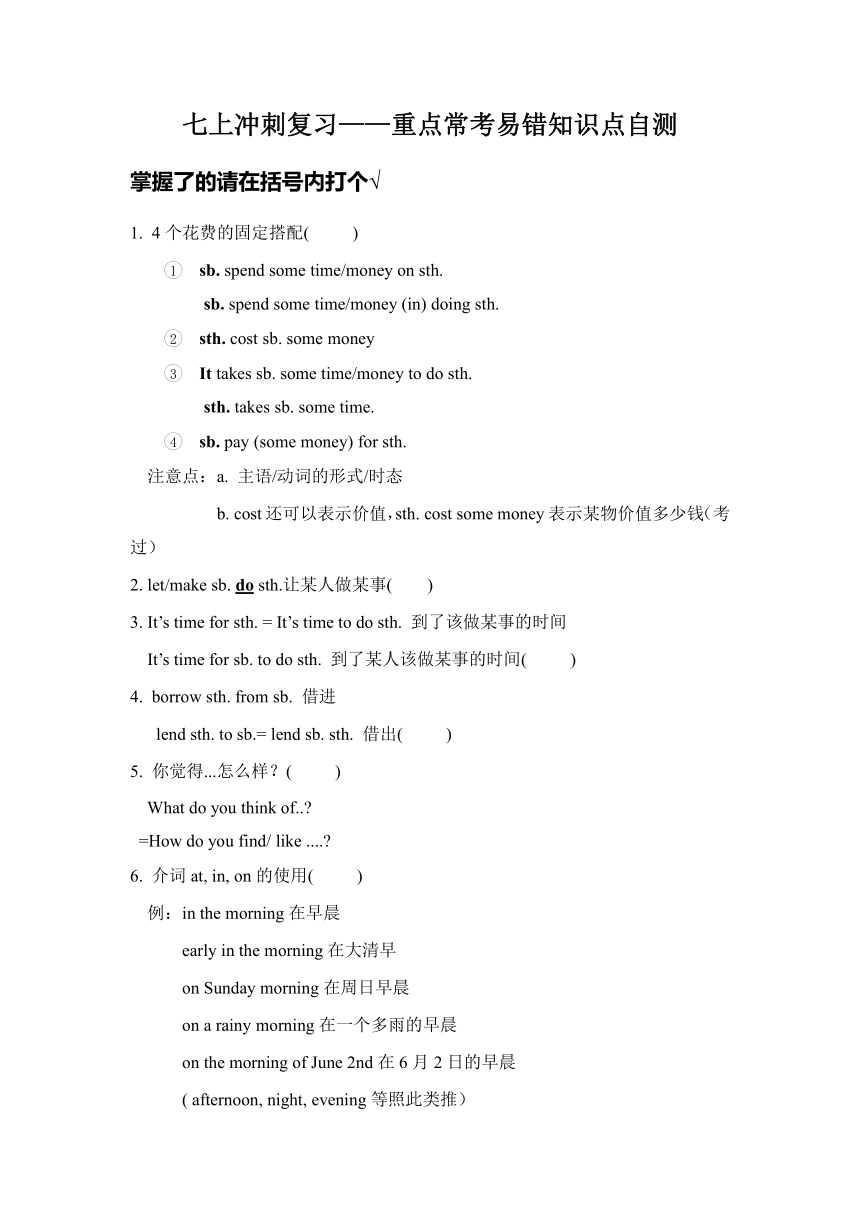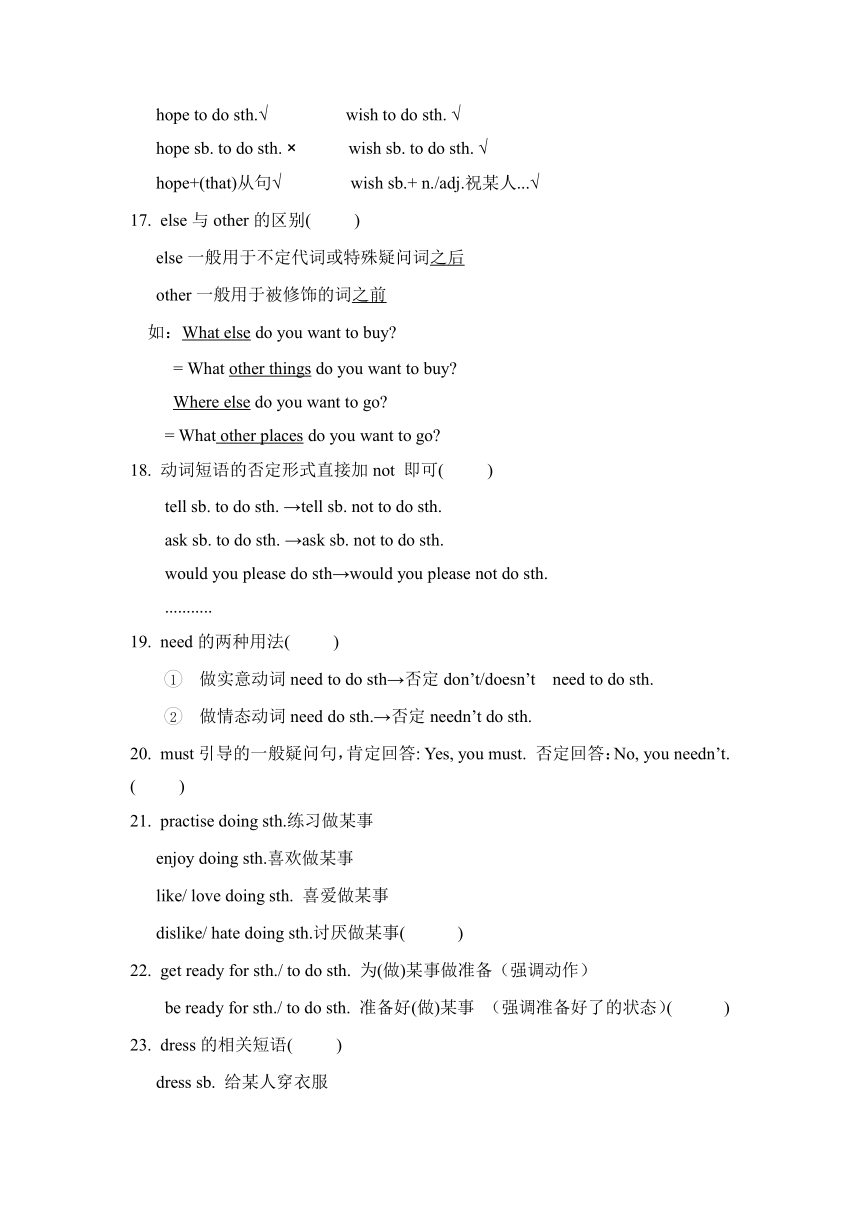2021-2022学年牛津译林版英语七年级上册期末冲刺复习—重点常考易错知识点自测
文档属性
| 名称 | 2021-2022学年牛津译林版英语七年级上册期末冲刺复习—重点常考易错知识点自测 |  | |
| 格式 | docx | ||
| 文件大小 | 22.8KB | ||
| 资源类型 | 教案 | ||
| 版本资源 | 牛津译林版 | ||
| 科目 | 英语 | ||
| 更新时间 | 2022-01-01 17:56:12 | ||
图片预览



文档简介
七上冲刺复习——重点常考易错知识点自测
掌握了的请在括号内打个√
4个花费的固定搭配( )
sb. spend some time/money on sth.
sb. spend some time/money (in) doing sth.
sth. cost sb. some money
It takes sb. some time/money to do sth.
sth. takes sb. some time.
sb. pay (some money) for sth.
注意点:a. 主语/动词的形式/时态
b. cost还可以表示价值,sth. cost some money表示某物价值多少钱(考过)
2. let/make sb. do sth.让某人做某事( )
3. It’s time for sth. = It’s time to do sth. 到了该做某事的时间
It’s time for sb. to do sth. 到了某人该做某事的时间( )
borrow sth. from sb. 借进
lend sth. to sb.= lend sb. sth. 借出( )
你觉得...怎么样?( )
What do you think of..
=How do you find/ like ....
介词at, in, on的使用( )
例:in the morning在早晨
early in the morning在大清早
on Sunday morning在周日早晨
on a rainy morning在一个多雨的早晨
on the morning of June 2nd在6月2日的早晨
( afternoon, night, evening等照此类推)
注意:on Halloween在万圣节 at Christmas= on Christmas Day在圣诞节
关于like的几个句型( )
What is sb. like 询问长相或性格特征
What does sb. look like 询问长相
What does sb. like 询问喜欢什么
不定代词someone/ everyone/ anyone/ nobody/ everything/ nothing...做主语时,
都看成是单数 ( )
family强调“家庭”整体时,看成是单数( )
强调“家里的每一个成员”时,看成是复数
例:Tom’s family has a large farm. Tom家有个大农场。
My family all like fruits.
表示建议的几个句型( )
How/What about +V-ing?
Why not/ Why don’t you+ V-原形?
Shall we+V-原形?
看见某人(正)在做某事( )
see sb. do sth. (强调全过程/经常性)
see sb. doing sth. (强调瞬间动作/偶然性)
含有with/together with的主语,主看with/ together with 前的主语是单数还是复数( )
13.have a good time/ have fun (in) doing sth. ( )
14. 系动词:be动词、feel、taste、look、smell、sound等词后面,用形容词修饰。( )
注意:well也可以做副词,但是意思是“身体健康的”
want sth.= would like sth.
want to do sth.= would like to do sth.
want sb. to do sth.= would like sb. to do sth. ( )
hope与wish的区别( )
hope to do sth.√ wish to do sth. √
hope sb. to do sth. × wish sb. to do sth. √
hope+(that)从句√ wish sb.+ n./adj.祝某人...√
else与other的区别( )
else一般用于不定代词或特殊疑问词之后
other一般用于被修饰的词之前
如:What else do you want to buy
= What other things do you want to buy
Where else do you want to go
= What other places do you want to go
动词短语的否定形式直接加not 即可( )
tell sb. to do sth. →tell sb. not to do sth.
ask sb. to do sth. →ask sb. not to do sth.
would you please do sth→would you please not do sth.
...........
need的两种用法( )
做实意动词need to do sth→否定don’t/doesn’t need to do sth.
做情态动词need do sth.→否定needn’t do sth.
must引导的一般疑问句,肯定回答: Yes, you must. 否定回答:No, you needn’t. ( )
practise doing sth.练习做某事
enjoy doing sth.喜欢做某事
like/ love doing sth. 喜爱做某事
dislike/ hate doing sth.讨厌做某事( )
get ready for sth./ to do sth. 为(做)某事做准备(强调动作)
be ready for sth./ to do sth. 准备好(做)某事 (强调准备好了的状态)( )
dress的相关短语( )
dress sb. 给某人穿衣服
dress up 打扮,化妆,乔装打扮
dress up as...打扮成...,装扮成...
dress up in... 穿上..(衣服或颜色)
because和so不可以连用在同一个句子里( )
thank you/thanks for sth. 因某事而感谢某人
thank you/thanks for doing sth.因做某事而感谢某人 ( )
if的用法( )
做“如果”讲,用主将从现
做“是否”讲,该用什么时态就是什么时态。(了解)
例:If it doesn’t rain tomorrow, we will go to the supermarket.(如果)
I don’t know if he will come tomorrow. (是否)
make sth. out of sth. = use sth. to do sth. 用...做出... ( )
seem的用法( )
seem ( to be) +adj. 似乎/看上去...
It seems (that) +从句
be different from...与...不同
反: be the same as...与...相同
It is+adj.(+for sb.) to do sth.对某人来说,做某事是...的
hundred/thousand与具体数字连用时,不加of,也不加s
不与具体数字连用时,加of,也加s
如:three hundred people
Hundreds of people
the other, another, others, the others的区别( )
例1:◎←one ◎←the other(2个中的另一个)
I have two pens, one is blue, the other is red.
例2:◎←one ◎ ◎ ◎←another ◎ (3个或以上的另一个)
I have many pens, one is blue, another is red.
例3:◎ ◎ ◎ ◎ ◎ ◎ ◎
↑ ↑
some the others(剩下的全部)
I have many pens, some are blue, the others are red.
例4:◎ ◎ ◎ ◎ ◎ ◎ ◎ ◎
↑ ↑
some others(还有一些)
I have many pens, some are blue, others are red.
whole与all的区别( )
限定词+whole+单数名词 如:the whole school
all+ 限定词+不可数名词/可数名词复数 如: all the books
all 放在be之后,实意动词之前。
Japanese, sheep, Chinese单复数同形
police一般看成是复数( )
wait a moment/ just a minute稍等片刻
wait for sb.等待某人
How much do/does...cost = What’s the price of... ( )
every一般用于三者或三者以上,只可做形容词,修饰单数名词。
如every student, every week ( )
each 可以与介词连用,如each of.. ,而every不可以
enough用于名词之前,形容词或副词之后
another ten apples= ten more apples
between用于两者之间,among用于三者或三者以上
be made of (看的出原材料)
be made from (看不出原材料)
42. 年龄的表达方法:
He is 11 (years old). = He is at the age of 11 = He is a 11-year-old boy
注意: He is 11-yar-old. (x)
43. be busy with sth. 忙于某事
be busy (in) doing sth.忙于做某事
44. too much+不可数名词 too many+可数名词复数
much too +形容词/副词
45. 一次: 两次: 三次: 四次:
每个月2次:
watch TV 5 times a week------how many times
watch TV 5 times a week------how often
46. how soon----In 2 days.
how long----2 hours.
how far------30 minutes on foot.
47. magazine可数名词, newspaper可数名词, picnic可数名词
vegetable可数名词, fruit不可数名词
48. always(反)——always= all the times
not like= dislike
not often= seldom
49. 在every, each, this, these, next, last, tomorrow, today, yesterday, one, all等词前,一般不用at, in, on,属于固定用法
掌握了的请在括号内打个√
4个花费的固定搭配( )
sb. spend some time/money on sth.
sb. spend some time/money (in) doing sth.
sth. cost sb. some money
It takes sb. some time/money to do sth.
sth. takes sb. some time.
sb. pay (some money) for sth.
注意点:a. 主语/动词的形式/时态
b. cost还可以表示价值,sth. cost some money表示某物价值多少钱(考过)
2. let/make sb. do sth.让某人做某事( )
3. It’s time for sth. = It’s time to do sth. 到了该做某事的时间
It’s time for sb. to do sth. 到了某人该做某事的时间( )
borrow sth. from sb. 借进
lend sth. to sb.= lend sb. sth. 借出( )
你觉得...怎么样?( )
What do you think of..
=How do you find/ like ....
介词at, in, on的使用( )
例:in the morning在早晨
early in the morning在大清早
on Sunday morning在周日早晨
on a rainy morning在一个多雨的早晨
on the morning of June 2nd在6月2日的早晨
( afternoon, night, evening等照此类推)
注意:on Halloween在万圣节 at Christmas= on Christmas Day在圣诞节
关于like的几个句型( )
What is sb. like 询问长相或性格特征
What does sb. look like 询问长相
What does sb. like 询问喜欢什么
不定代词someone/ everyone/ anyone/ nobody/ everything/ nothing...做主语时,
都看成是单数 ( )
family强调“家庭”整体时,看成是单数( )
强调“家里的每一个成员”时,看成是复数
例:Tom’s family has a large farm. Tom家有个大农场。
My family all like fruits.
表示建议的几个句型( )
How/What about +V-ing?
Why not/ Why don’t you+ V-原形?
Shall we+V-原形?
看见某人(正)在做某事( )
see sb. do sth. (强调全过程/经常性)
see sb. doing sth. (强调瞬间动作/偶然性)
含有with/together with的主语,主看with/ together with 前的主语是单数还是复数( )
13.have a good time/ have fun (in) doing sth. ( )
14. 系动词:be动词、feel、taste、look、smell、sound等词后面,用形容词修饰。( )
注意:well也可以做副词,但是意思是“身体健康的”
want sth.= would like sth.
want to do sth.= would like to do sth.
want sb. to do sth.= would like sb. to do sth. ( )
hope与wish的区别( )
hope to do sth.√ wish to do sth. √
hope sb. to do sth. × wish sb. to do sth. √
hope+(that)从句√ wish sb.+ n./adj.祝某人...√
else与other的区别( )
else一般用于不定代词或特殊疑问词之后
other一般用于被修饰的词之前
如:What else do you want to buy
= What other things do you want to buy
Where else do you want to go
= What other places do you want to go
动词短语的否定形式直接加not 即可( )
tell sb. to do sth. →tell sb. not to do sth.
ask sb. to do sth. →ask sb. not to do sth.
would you please do sth→would you please not do sth.
...........
need的两种用法( )
做实意动词need to do sth→否定don’t/doesn’t need to do sth.
做情态动词need do sth.→否定needn’t do sth.
must引导的一般疑问句,肯定回答: Yes, you must. 否定回答:No, you needn’t. ( )
practise doing sth.练习做某事
enjoy doing sth.喜欢做某事
like/ love doing sth. 喜爱做某事
dislike/ hate doing sth.讨厌做某事( )
get ready for sth./ to do sth. 为(做)某事做准备(强调动作)
be ready for sth./ to do sth. 准备好(做)某事 (强调准备好了的状态)( )
dress的相关短语( )
dress sb. 给某人穿衣服
dress up 打扮,化妆,乔装打扮
dress up as...打扮成...,装扮成...
dress up in... 穿上..(衣服或颜色)
because和so不可以连用在同一个句子里( )
thank you/thanks for sth. 因某事而感谢某人
thank you/thanks for doing sth.因做某事而感谢某人 ( )
if的用法( )
做“如果”讲,用主将从现
做“是否”讲,该用什么时态就是什么时态。(了解)
例:If it doesn’t rain tomorrow, we will go to the supermarket.(如果)
I don’t know if he will come tomorrow. (是否)
make sth. out of sth. = use sth. to do sth. 用...做出... ( )
seem的用法( )
seem ( to be) +adj. 似乎/看上去...
It seems (that) +从句
be different from...与...不同
反: be the same as...与...相同
It is+adj.(+for sb.) to do sth.对某人来说,做某事是...的
hundred/thousand与具体数字连用时,不加of,也不加s
不与具体数字连用时,加of,也加s
如:three hundred people
Hundreds of people
the other, another, others, the others的区别( )
例1:◎←one ◎←the other(2个中的另一个)
I have two pens, one is blue, the other is red.
例2:◎←one ◎ ◎ ◎←another ◎ (3个或以上的另一个)
I have many pens, one is blue, another is red.
例3:◎ ◎ ◎ ◎ ◎ ◎ ◎
↑ ↑
some the others(剩下的全部)
I have many pens, some are blue, the others are red.
例4:◎ ◎ ◎ ◎ ◎ ◎ ◎ ◎
↑ ↑
some others(还有一些)
I have many pens, some are blue, others are red.
whole与all的区别( )
限定词+whole+单数名词 如:the whole school
all+ 限定词+不可数名词/可数名词复数 如: all the books
all 放在be之后,实意动词之前。
Japanese, sheep, Chinese单复数同形
police一般看成是复数( )
wait a moment/ just a minute稍等片刻
wait for sb.等待某人
How much do/does...cost = What’s the price of... ( )
every一般用于三者或三者以上,只可做形容词,修饰单数名词。
如every student, every week ( )
each 可以与介词连用,如each of.. ,而every不可以
enough用于名词之前,形容词或副词之后
another ten apples= ten more apples
between用于两者之间,among用于三者或三者以上
be made of (看的出原材料)
be made from (看不出原材料)
42. 年龄的表达方法:
He is 11 (years old). = He is at the age of 11 = He is a 11-year-old boy
注意: He is 11-yar-old. (x)
43. be busy with sth. 忙于某事
be busy (in) doing sth.忙于做某事
44. too much+不可数名词 too many+可数名词复数
much too +形容词/副词
45. 一次: 两次: 三次: 四次:
每个月2次:
watch TV 5 times a week------how many times
watch TV 5 times a week------how often
46. how soon----In 2 days.
how long----2 hours.
how far------30 minutes on foot.
47. magazine可数名词, newspaper可数名词, picnic可数名词
vegetable可数名词, fruit不可数名词
48. always(反)——always= all the times
not like= dislike
not often= seldom
49. 在every, each, this, these, next, last, tomorrow, today, yesterday, one, all等词前,一般不用at, in, on,属于固定用法
同课章节目录
- 预备课程
- Lesson 1 Nice to meet you !
- Lesson 2 A happy family
- Lesson 3 A nice school
- Lesson 4 You look cool !
- Lesson 5 Wonderful things
- Lesson 6 Have nice food
- Lesson 7 Enjoy our days
- Lesson 8 Let's have fun !
- Unit 1 This is me
- Unit 2 Let's play sports
- Unit 3 Welcome to our school
- Unit 4 My day
- Unit 5 Let’s celebrate
- Unit 6 Food and lifestyle
- Unit 7 Shopping
- Unit 8 Fashion
